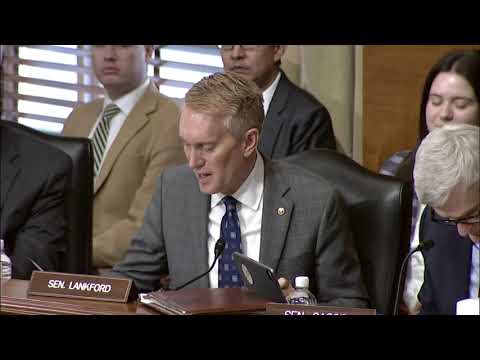WASHINGTON, DC – Senator James Lankford (R-OK) today addressed the lagging permitting process for energy projects in the US and where we stand with reforms to improve that process. At today’s Energy and Natural Resources Committee hearing to examine implementation of the Infrastructure Investment and Jobs Act (IIJA), which Lankford opposed, Lankford questioned Mr. Tommy Beaudreau, Deputy Secretary for the Department of the Interior (DOI).
In August, Lankford joined Senator Kevin Cramer (R-ND) to lead their colleagues in urging DOI Secretary Deb Haaland to implement provisions of the infrastructure law which streamlined permitting for oil and natural gas infrastructure. In the letter, the Senators highlighted a section of the IIJA which gave the Biden Administration authority to categorically exclude certain energy-related infrastructure projects from the National Environmental Policy Act (NEPA) on public and applicable Indian lands to prevent wasteful venting or flaring of natural gas. As Democrats and the Biden Administration push for punitive taxes and regulations on methane from oil and gas production, this section of IIJA is an available tool, currently unused by DOI, to reduce methane and carbon dioxide emissions on federal lands. The Senators’ letter went unanswered until the night before the hearing.
IIJA also required agencies to submit a report to Congress within one year that outlines the length of time it typically takes to review and approve mineral activities on federal lands, and identifies regulatory or legislative changes that would improve the efficiency of the permitting process. The report was due by November 15, 2022 but has not yet been received.
Earlier this year, Lankford participated in a Senate Energy and Natural Resources Committee hearing on domestic critical mineral supply chains and how we continue to source critical minerals here in the US and with our allies, rather than importing them from unfriendly nations like China. Lankford’s questions then, like today, focused on opening up domestic critical mineral mining and processing and ensuring we can pursue that safely and effectively.
Lankford also introduced a bill to establish a secure supply chain of critical minerals and counter China’s market dominance by leveraging the Quadrilateral Security Dialogue (Quad) partnership, which includes the US, Australia, India, and Japan. Lankford also authored legislation expanding the Department of Energy’s Title 17 loan program to include critical minerals development, processing, and recycling projects, which became law in 2021.
Excerpts
On when Lankford can expect an Interior report on permitting efficiency
Lankford: …There were some required reports that were to come out to say what are we going to do to improve permitting, especially for critical minerals and mining and other things on that as well. That report was due by November 15th of this year. Has that report been released yet?
Beaudreau: The report hasn’t been released yet.
Lankford: When is that coming?
Beaudreau: It will be out early next year.
On the Status of the Earth Survey Mapping Resource for mapping mineral deposits
Lankford: There’s been literally millions of dollars put out on that. Give us an update on where that mapping is going. For what minerals that we actually have here in the United States.
Beaudreau: Again, that process is ongoing through the US Geological Survey. But it is one of the most valuable investments being made under these pieces of legislation to support state operators as well as provide our agencies with the ability to identify resources and engage in deconfliction and accelerate production.
Lankford: When do you think that will be complete?
Beaudreau: Next Year.


